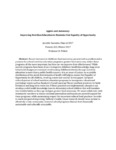| dc.rights.license | In Copyright | en_US |
| dc.creator | Saccente, Jennifer Elizabeth | |
| dc.date.accessioned | 2017-05-22T13:01:39Z | |
| dc.date.available | 2017-05-22T13:01:39Z | |
| dc.date.created | 2017 | |
| dc.identifier | WLURG38_Saccente_POV_2017 | |
| dc.identifier.uri | http://hdl.handle.net/11021/33870 | |
| dc.description | Jennifer Elizabeth Saccente is a member of the Class of 2017 of Washington and Lee University. | en_US |
| dc.description | Capstone; [FULL-TEXT FREELY AVAILABLE ONLINE] | en_US |
| dc.description.abstract | Recent increases in children's food autonomy present both a problem and a promise for school nutrition education programs: greater food autonomy makes these programs all the more important, but how can we improve their effectiveness? While current programs have been shown to improve children's health knowledge, long-term behavioral changes are minimal. Ameliorating childhood obesity through nutrition education is more than a public health concern, it is an issue of justice: an equitable distribution of the social determinants of health will help to ensure Fair Equality of Opportunity for all children, creating a more just society. In this paper, I propose redevelopment of school nutrition education programs to incorporate educational psychology tenets such as Bandura's Social Learning Theory and best practices for habit formation and long-term retention. If these practices are implemented, educators can develop a solid health knowledge base in elementary school children that will translate into healthy habits as they age and gain greater food autonomy. We must collaborate with community members to ensure minimal paternalism and maximum parental support for these programs, while maintaining respect for important cultural food practices. In order to reach our goal of improving children's health, future research should focus on how to effectively create community-centered school programs that are both financially sustainable and culturally acceptable. | en_US |
| dc.description.statementofresponsibility | Jennifer Saccente | |
| dc.format.extent | 34 pages | en_US |
| dc.language.iso | en_US | en_US |
| dc.rights | This material is made available for use in research, teaching, and private study, pursuant to U.S. Copyright law. The user assumes full responsibility for any use of the materials, including but not limited to, infringement of copyright and publication rights of reproduced materials. Any materials used should be fully credited with the source. | en_US |
| dc.rights.uri | http://rightsstatements.org/vocab/InC/1.0/ | en_US |
| dc.subject.other | Washington and Lee University -- Capstone in Shepherd Program for the Interdisciplinary Study of Poverty and Human Capability | en_US |
| dc.title | Apples and Autonomy: Improving Nutrition Education to Maximize Fair Equality of Opportunity | en_US |
| dc.type | Text | en_US |
| dcterms.isPartOf | RG38 - Student Papers | |
| dc.rights.holder | Saccente, Jennifer Elizabeth | |
| dc.subject.fast | Nutrition | en_US |
| dc.subject.fast | Diet | en_US |
| dc.subject.fast | Health education (Elementary) | en_US |
| dc.subject.fast | Bandura, Albert, 1925- | en_US |
| local.department | Shepherd Poverty Program | en_US |
| local.scholarshiptype | Capstone | en_US |
